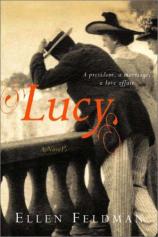Reading Group Guide
Discussion Questions
Lucy

1. How do the various fictional techniques such as dialogue, interior monologues, and the change of point of view --- as when Lucy imagines Eleanor finding her letters --- enhance your understanding of the characters and their historically documented actions?
2. Each chapter is preceded by quotations from contemporary characters or historical sources. Some of these observations, however, are mutually contradictory. What do you think this says about this story in particular and the writing of history and historical fiction in general?
3. Lucy is an "unreliable narrator." Was there some point at which you realized this or did it dawn on you gradually? How do you think her unreliability deepens the book and makes it more complex?
4. Traditional interpretations of this chapter of American history have stereotyped Eleanor Roosevelt as the "wronged wife" and Lucy Mercer as "the other woman." Do you believe this assessment is fair? Did you feel sympathy for both women? Did your sympathies shift, and if so, at what points?
5. The book begins with a quotation from Arthur Schlesinger, Jr., stating that "if Lucy Mercer in any way helped Franklin Roosevelt sustain the frightful burdens of leadership in the Second World War, the nation has good reason to be grateful to her." Do you agree with this assessment?
6. The character Lucy speaks of the mores of another era. How did the book bring that world to life? Did it allow you to suspend contemporary judgment and current expectations for men and women and understand the characters in terms of their own times?
7. The character Franklin Delano Roosevelt is at the center of the novel just as the public figure FDR was the center of the world at the time. Few would dispute that he was one of our greatest presidents. Many criticize his behavior toward those close to him. Do you think great men and women should be held to the same standards of personal behavior as ordinary individuals or must society give them more leeway?
8. Lucy is written in the voice of an Edwardian woman who died midway through the last century. Discuss the language and sensibilities that ground her voice in another era.
9. One historical fact, which is revealed for the first time in the book, is that the earliest visit of which we have proof of Lucy Mercer Rutherford to the White House occurred the day after Missy LeHand suffered her debilitating stroke. How do you feel about FDR's behavior that day?
10. Historians usually ascribe FDR's transformation from callow politician to compassionate visionary to his contraction of polio. Some of his contemporaries, however, said loving and losing Lucy Mercer set the metamorphosis in motion. Were there points in the book when you sensed that FDR was changing?
11. Lucy strives to make legendary characters human. Does knowing more about Eleanor Roosevelt's flaws make you think she was any less great a woman, or does recognizing the personal problems with which she struggled increase your admiration for her?
12. FDR's longtime secretary, Missy LeHand, is a minor character in the novel but a crucial factor in FDR's life. Both she and Lucy loved Franklin Roosevelt. Neither could have him. Lucy chose to marry another man and raise a family. Missy refused offers of marriage and devoted her life to serving FDR. How do you feel about the validity of each choice within the terms of the time?
13. Franklin and Eleanor Roosevelt had a flawed marriage but a brilliant political partnership, which was possible only because they remained together. Do you think their sacrifices were worth it?
14. In an unpublished article, Anna Roosevelt Halstead, the eldest child and only daughter of Franklin and Eleanor, wrote, "It has always seemed to me that the greatest contradiction in my parents was, on the one hand their supreme ability to relate to either groups of people or individuals who had problems, and on the other hand, their apparent lack of ability to relate with the same consistent warmth and interest to an individual who was their child." Did their parental failings come through in the book, and what do you think those flaws say about the conflict between public and personal life?
15. In the book, when FDR stops at Lucy's estate for lunch, he points out that a kind of "gentleman's agreement" exists between the press and public figures. That agreement is no longer in effect today. Do you think our public life is better or worse for it?
16. Novelists often ask themselves what their characters want. What do you think each of the three main characters --- Lucy, Franklin, and Eleanor --- wanted?
17. Most historians portray FDR's mother, Mrs. James, as a domineering matriarch, but her granddaughter Anna maintained that it was Mrs. James who gave FDR his courage and confidence and it was that courage and confidence that made him a great leader. Discuss Mrs. James's influence on both Franklin and Eleanor.
Lucy
- Publication Date: March 8, 2013
- Paperback: 304 pages
- Publisher: W. W. Norton & Company
- ISBN-10: 0393325105
- ISBN-13: 9780393325102







